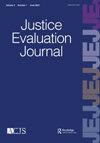Optimizing Community Supervision Practices with the Elo-rating System: A Proof-of-Concept
IF 0.7
Q3 CRIMINOLOGY & PENOLOGY
引用次数: 0
Abstract
Abstract Record numbers of offenders are being released to community supervision. This poses a challenge to agencies and officers in charge of providing supervision because there are far more clients in need of supervision than officers can reasonably attend to. This challenge represents an opportunity for criminologists to work with agencies to find innovative ways to allocate their limited resources. Standardized risk assessments are the most commonly used tool for determining which clients receive the most resources (e.g., officer attention). But risk assessment is a static instrument that is incapable of making cross-client predictions. We offer a novel, dynamic approach by integrating the Elo-rating system into the risk assessment paradigm. Our study is meant to present a potential innovative solution and to demonstrate that it may have merit when applied in practice. We test our idea against data from the Pathways to Desistance Study and show that the Elo-rating system is a flexible tool that can be used to adjust to changes in risk more rapidly than standard risk assessment tools. We also show that the Elo-rating system, when combined with risk assessment, can increase the accuracy of prospective predictions of recidivism risk. We discuss how Elo-rating system could be used by community supervision agencies seeking to optimize decision-making.以Elo-rating系统优化社区监督实践:概念验证
被释放到社区监管的罪犯数量创下历史新高。这对负责提供监管的机构和官员构成了挑战,因为需要监管的客户远远超出了官员的合理照顾范围。这一挑战为犯罪学家提供了一个机会,可以与各机构合作,寻找创新的方式来分配其有限的资源。标准化风险评估是确定哪些客户获得最多资源(例如,官员关注)的最常用工具。但风险评估是一种静态工具,无法做出跨客户的预测。我们通过将elo评级系统集成到风险评估范式中,提供了一种新颖的动态方法。我们的研究旨在提出一种潜在的创新解决方案,并证明它在实践中应用时可能具有优点。我们用“阻力路径研究”的数据测试了我们的想法,结果表明,与标准风险评估工具相比,elo评级系统是一种灵活的工具,可以用来更快地适应风险变化。我们还表明,当与风险评估相结合时,elo评级系统可以提高再犯风险预期预测的准确性。我们讨论了社区监督机构如何使用elo评级系统来寻求优化决策。
本文章由计算机程序翻译,如有差异,请以英文原文为准。
求助全文
约1分钟内获得全文
求助全文

 求助内容:
求助内容: 应助结果提醒方式:
应助结果提醒方式:


